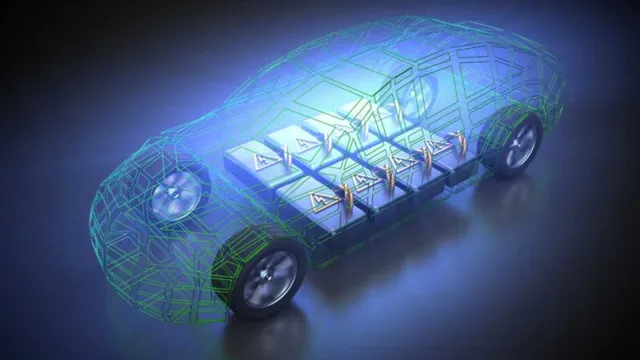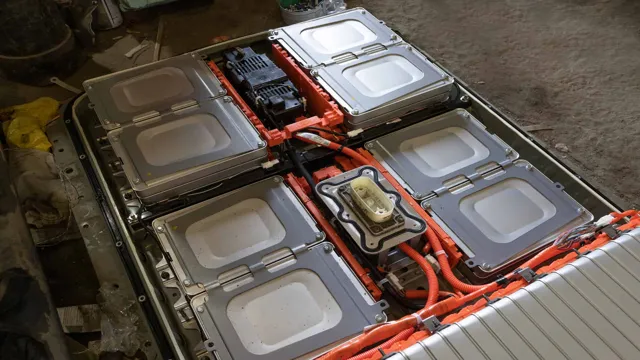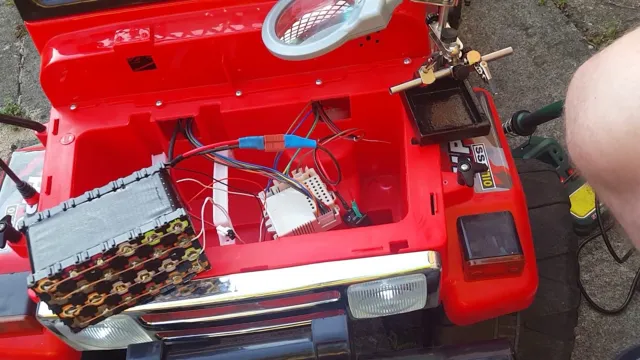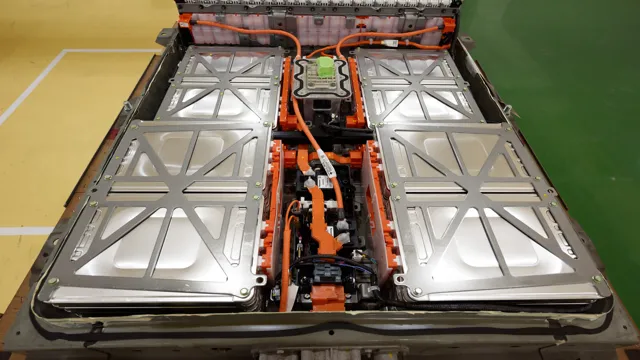The Shocking Truth about Electric Car Battery Replacement: Debunking Myths and Exploring Solutions
Do you know what happens when the battery of your electric car goes flat? Replacing traditional fuel with electric energy has been a trend in recent years. The appeal of electric cars is the convenience of not having to constantly refill your gas tank, but often, people wonder about the process of replacing an electric car battery. There are a few theories surrounding electric car battery replacement, and as technology continues to grow, the process is becoming more accessible and efficient.
The replacement theory is based on the fact that the cost of replacing a battery has decreased dramatically, making it a much more viable option for car owners. This technology is still growing and developing, with improvements including faster charging and longer battery life. As the world shifts towards a greener future, it’s beneficial to understand the science behind electric car batteries and how they can be replaced.
In this blog, we’ll explore the current theories surrounding electric car battery replacement and what they could mean for the future of sustainable transportation.
Understanding Battery Degradation
Electric car battery replacement theory is a topic that many EV owners are curious about. Battery degradation is a natural process that occurs over time as the battery is used and charged. It is important to note that battery degradation is normal and expected, and does not necessarily mean that the battery needs to be replaced immediately.
In fact, most EV manufacturers offer warranties that cover battery degradation for a certain number of years or miles. However, eventually, the battery will degrade to a point where its capacity is significantly reduced, and it may need to be replaced. The timing of battery replacement will depend on various factors, such as the driving habits of the owner and environmental conditions.
It’s important to have a basic understanding of battery degradation to ensure that you are getting the most out of your electric vehicle.
Environmental Factors
Battery degradation is a natural process caused by several environmental factors. One of these is temperature, as high temperatures can accelerate the chemical reactions that occur within the battery, leading to a faster breakdown of its components and reduced capacity over time. Conversely, storing batteries in extremely cold environments can also lead to degradation, as the battery’s electrolyte solution becomes less effective at low temperatures.
Another factor that can affect battery life is humidity, which can cause corrosion and other damage to the battery’s internal components if left uncontrolled. Additionally, the frequency of charging and discharging a battery can also impact its lifespan, as overcharging or deep discharging can cause irreversible damage to the battery cells. By understanding these environmental factors, battery users can take steps to prolong their battery’s lifespan and ensure optimal performance over time.

Usage Patterns
As we use our devices, we might start to notice that over time, the battery life decreases. This phenomenon is called battery degradation, and it occurs when the battery’s ability to hold a charge starts to diminish. Understanding battery degradation is important because it can affect our usage patterns and how we use our devices.
One of the factors that can cause battery degradation is heat. Batteries are sensitive to high temperatures, and exposing them to hot environments can shorten their lifespan. Another factor is time.
As batteries age, they naturally start to lose their ability to hold a charge. This means that a battery that used to last all day might now need to be charged more frequently. By understanding battery degradation and taking steps to minimize it, such as keeping our devices cool and not letting them fully discharge, we can help ensure that our batteries last as long as possible.
Factors That Affect Battery Life
When it comes to electric car battery replacement theory, it’s important to understand the factors that affect the lifespan of your battery. One of the biggest factors is how often you charge your battery and to what level. Charging your battery frequently and to a high level can decrease its overall lifespan.
Another factor is the temperature at which your battery operates. Extreme heat or cold can cause damage to the cells and decrease the battery’s performance. Additionally, the age of your battery is an important factor to consider.
Over time, the degradation of battery cells can lead to decreased performance and may ultimately require replacement. By taking these factors into consideration, you can better understand the lifespan of your electric car battery and make decisions to maximize its overall performance and longevity.
Frequent Fast Charging
Frequent Fast Charging can significantly affect the lifespan of your battery. Lithium-ion batteries, which are commonly found in smartphones, have a limited number of cycles they can go through before they start losing capacity. Every time you charge your phone, a cycle is counted, and frequent fast charging can shorten the battery life even further.
This is because fast charging generates more heat, which is one of the biggest enemies of battery life. Heat causes the battery to degrade faster, and if you are constantly fast charging your phone, it will cause more stress on the battery and decrease its lifespan. Additionally, charging your phone to 100% every time can also contribute to battery degradation, so it’s better to stop charging at around 80% or 90%.
If you want to prolong the life of your battery, try to avoid frequent fast charging and charge your phone regularly in short bursts.
High Temperatures
High Temperatures When it comes to battery life, high temperatures can be a real problem. The hotter the battery gets, the faster it will degrade over time. This is because high temperatures can cause chemical reactions within the battery to occur more quickly, which can lead to a shorter overall lifespan.
Additionally, high temperatures can cause the battery to lose its charge more quickly, meaning you’ll have to recharge it more frequently. So, what can you do to avoid high temperatures and extend the life of your battery? One option is to avoid leaving your battery in direct sunlight or in places with high heat, such as the dashboard of a car. You can also try to keep your battery ventilated and avoid using it in very hot environments.
Overall, taking steps to keep your battery cool and avoid high temperatures can help to extend its life and save you money in the long run.
Depth of Discharge
Depth of Discharge When it comes to battery life, one of the most crucial factors to consider is the depth of discharge. In other words, how much of the battery’s charge is used up before recharging? The deeper the discharge, the shorter the battery’s lifespan. Typically, it’s recommended to keep the depth of discharge between 20-80%.
If you regularly allow your battery to discharge below 20%, it can lead to irreversible damage, reducing its capacity and overall lifespan over time. On the other hand, if you only use up 20% of the battery’s capacity before recharging it, you’re not getting the full use out of your battery, and it can become less efficient over time. So, it’s essential to find a balance between using your device and preserving the battery life by not discharging it too deeply.
By doing so, you can increase the battery’s longevity and avoid unnecessary replacements.
When to Replace the Battery
When it comes to electric car battery replacement theory, there are a few factors to consider before replacing the battery in your vehicle. Typically, electric car batteries are designed to last between 8 to 10 years, or around 100,000 miles, before needing to be replaced. However, this can vary based on factors such as temperature, charging habits, and how frequently the battery is used.
If you notice a decline in your car’s battery capacity, such as a decrease in mileage or slower charging times, it may be time to consider a replacement. Another factor to consider is the cost of replacing the battery. While prices for electric car batteries have decreased in recent years, they can still be expensive to replace.
It’s important to weigh the cost of a replacement against the remaining lifespan of the vehicle and your overall budget. Regular maintenance and monitoring of the battery can help extend its lifespan and delay the need for a replacement.
Impact on Performance
The battery in your device impacts its performance significantly, and hence it is crucial to know when to replace it. As the battery gets older, it loses its ability to hold a charge, resulting in reduced performance. You might notice that your device takes longer to charge, drains faster than before, or even suddenly shuts down.
These are all signs that your battery is nearing the end of its lifespan and needs a replacement. Another way to check the battery health is to go to your device’s settings and check for the battery health status. If the battery’s maximum capacity has significantly reduced, it is a clear indication that you need to replace it.
Failing to replace the battery at the right time can also affect your device’s overall health and cause damage to its internal components. Therefore, it is best to keep an eye on the battery’s performance and replace it promptly before it causes any further harm.
Safety Concerns
As we use our electronic devices, we tend to forget that their batteries have an expiration date. Knowing when to replace the battery is crucial, particularly for our safety and the longevity of the device. Typically, a battery’s lifespan is determined by the number of charging cycles, and it varies from one device to another.
If you notice that the charging performance has decreased, or the device shuts down frequently, then it might be time to replace the battery. A worn-out battery can also pose a safety hazard, as it is more prone to overheating and bursting, which can cause burns or even fires. Therefore, replacing the battery is not only beneficial for its performance, but also for our safety.
So, it’s best to keep an eye on the battery’s condition and replace it promptly when needed.
Options for Battery Replacement
Electric car battery replacement theory revolves around the idea of replacing the battery of an electric car once it reaches the end of its lifespan. There are different options available when it comes to battery replacement such as purchasing a new battery, getting a refurbished battery or opting for a remanufactured battery. A new battery provides the best performance, but it can be expensive.
Refurbished batteries are less expensive but may not have the same level of performance as a new battery. Remanufactured batteries are essentially old batteries that have been rebuilt, but they can provide a reliable and cost-effective solution. In any case, it’s important to ensure that the battery is compatible with the electric car and meets all necessary safety requirements.
Regular maintenance and monitoring of the battery can also extend its lifespan, making replacement less frequent. Ultimately, the decision to replace an electric car battery will depend on the individual circumstances, and it’s always best to consult with a professional before making any final decisions.
Conclusion
In conclusion, when it comes to electric car battery replacement theory, there’s no need for range anxiety or fear of the unknown! With increasing advancements in technology, replacing your electric car battery is becoming easier and more cost-effective than ever before. Not only will you be doing your part for the environment, but you’ll also be saving money in the long run. So next time you consider upgrading your vehicle, think electric and show the world that you’re charged up and ready to go electric!”
FAQs
What is the average lifespan of an electric car battery?
The average lifespan of an electric car battery is around 8-10 years, although some can last up to 15 years with proper maintenance.
How much does it cost to replace an electric car battery?
The cost to replace an electric car battery can vary depending on the make and model of the vehicle, but it can range from $3,000 to $10,000.
Is it possible to extend the life of an electric car battery?
Yes, it is possible to extend the life of an electric car battery by avoiding excessive heat and cold, not overcharging or undercharging, and regular maintenance.
Can electric car batteries be recycled?
Yes, electric car batteries can be recycled. The materials in the batteries, including lithium, cobalt, and nickel, can be reused in new batteries or other products.




